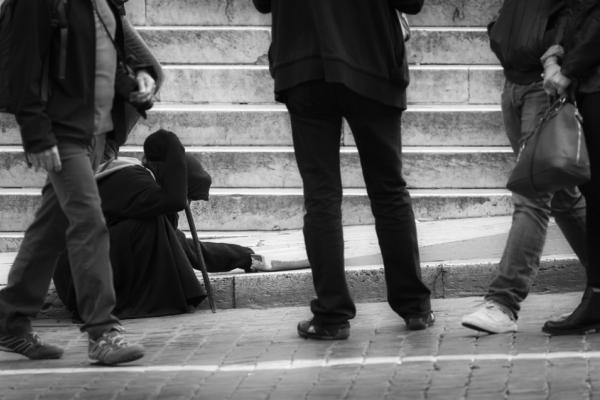“Excuse me, sir. I don’t have any cash, but I have a credit card, and I’m going to that restaurant right now. If you’re hungry, I’d be happy to have you join me.”
Well, I said something like that, though my French was a little rusty, and I might not have said it quite right.
The man was sitting on the sidewalk outside the train station. I’d just arrived in Paris after an overnight ride, and I was tired and hungry. The sign he was holding caught my eye: “I’m an out-of-work architect, and I need money for rent for my son and me.”
You just never know with panhandlers and street beggars. Are they telling the truth, or have they simply figured out how to pull our heartstrings? It’s easy to choose to ignore them, or to toss them some cash and pay off a guilty conscience. Don’t stop, just toss some coins and keep rolling on by. I was living in Madrid at the time, a city of five million people. Beggars are a daily fact of life in a city like that, and you need to find a way to deal with them. Eventually they become like busy intersections, crosswalks, gawking tourists, and all the other impediments to travel.
At the same time, I couldn’t help asking what Christ would do. “Give freely to all who ask,” he said. Love your neighbor, and if you have two cloaks, give one to the man who has none. But how much do I give, and to whom? As an introvert and as a college student with no income, I found it morally tiring, this tug between wanting to be prudent and wanting to be generous with the poor as God has been generous with me.
I hadn’t exchanged any money yet, so I couldn’t just give this man a few coins. I don’t know what moved me to speak to him, but I decided to give him what I could.
“So, would you like to join me?” I asked. Immediately he dropped his sign right there on the sidewalk and started to cross the street with me. The restaurant was a fast-food place, so we stepped up to the counter and I ordered a meal. “What would you like?” I asked.
“Nothing,” he replied.
“Are you sure? Aren’t you hungry?”
“No,” he said. “I’m out of work, and need money for rent, but my son and I have enough food for now. The thing is, I really just want a job, and sitting there begging for money feels awful. People don’t look at you, they don’t talk to you. I came with you because you treated me like a person, and frankly, I just wanted someone to talk to.”
My food came up, and I got him a cup of coffee. We sat at the table for twenty minutes or so, talking about his life, his work as an architect, his 10-year-old son. He invited me to his home for dinner that night, but I already had plans to meet friends, and then had to move on to my next destination. Still, I was moved by the invitation.
I’d love to tell you that since then I have become much more generous with beggars, or that I’ve figured out just how to treat strangers on the street. The fact is this was an isolated incident. It has been more than 20 years since that happened, but I often think of that man. I wonder how he is, and how his now 30+-year-old son must be. I came so close to passing him by, just like I pass by most beggars on most days. I try not to get too close to panhandlers, or to make eye contact with people with their hands out on the street. You just never know.
But there’s the thing, right? You just never know. There’s no way to know, just from looking at the sign. Maybe he was a con man, or maybe he was just my brother, genuinely in need of human contact to maintain his dignity. Or maybe he was even more than that. How does that passage go? “Some of you have entertained angels unawares.” For all I know, that man was one of the divine architects, one of God’s angels, sent to greet me. It makes me wonder where the next angel is sitting, and whether I’ll have enough of the love of God in my heart to look him in the eyes and ask him to lunch.
David O’Hara is a professor in the department of Religion, Philosophy, and Classics at Augustana College, an ELCA Lutheran college in South Dakota, where he directs the philosophy program. He is the author of several books, including a book on C.S. Lewis' environmental vision. His most recent book, Downstream, is about faith, ecology, and fly-fishing for brook trout. O’Hara also contributes to the Chronicle of Higher Education and blogs here.
Image: Beggar among a crowd, Lasse Ansaharju / Shutterstock.com
Got something to say about what you're reading? We value your feedback!
